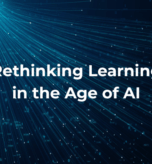Rethinking Learning in the Age of AI.
Artificial intelligence is changing the way law firms operate. It is not only influencing the delivery of legal services but also reshaping the way professionals develop their skills. In the past, technology training focused on specific tools such as document management systems, time recording platforms, or office productivity software. Today, the arrival of AI requires a different approach. It is not simply a new application to learn; it represents a new way of working. Training must focus on judgement, digital literacy, and confidence in collaborating with technology.
This article explores how AI is changing professional learning in law firms and what IT trainers need to prioritise to help people navigate transformation, transition, and automation.
Learning in a Changing Legal Landscape
Traditionally, technology training focused on efficiency and compliance. AI alters this dynamic.
AI can accelerate access to knowledge, but it may also reduce exposure to tasks that traditionally develop analytical skills, such as manual document review. Learning programmes need to adapt to ensure lawyers still gain critical thinking and problem-solving experience.
Technology is no longer static. AI tools evolve rapidly, so learning cannot be a single event. Continuous learning and opportunities to experiment are essential. Building confidence is as important as building competence. Many legal professionals are cautious or sceptical about new technologies, and training must address this through practical experience and guidance.
Developing New Skills
AI does not replace legal skills; it changes the way they are applied. People need to develop three core capabilities.
- AI Literacy: Legal professionals need to understand what AI can and cannot do. They should recognise the differences between traditional automation and generative AI, be aware of common errors, and understand ethical considerations. This knowledge is important for all people, not only lawyers.
- Critical Evaluation and Validation: AI outputs are starting points, not finished products. Lawyers must be trained to cross-check results, apply professional judgement, and document how AI has been used. This ensures transparency and accountability while reducing the risk of mistakes.
- Collaborative Working with AI: AI is most effective when it supports human decision-making. Training should focus on how to integrate AI into workflows. Professionals need to see AI as a tool to complement their work rather than replace it.
The Role of IT Trainers
The role of IT trainers is evolving. Traditional training focuses on teaching features and functions. With AI, the emphasis shifts to behaviour and mindset. Trainers guide people in integrating technology into their workflows, modelling best practice, and creating safe spaces for experimentation.
Training should be continuous. AI tools are constantly updated, and people need ongoing support through short, focused sessions. The focus must extend beyond ‘how to use the tool’ to include when and why it should be used, in context.
Learning pathways should be tailored to different roles. Partners, associates, paralegals, and support staff interact with technology in different ways. Role-specific learning ensures that everyone develops the skills they need to use AI responsibly and effectively.
Building Confidence
One of the greatest challenges with AI adoption is overcoming fear. People may worry about making mistakes or losing control of their work. Training can address this through realistic exercises that reflect everyday tasks. For example, scenarios could include reviewing AI-generated drafts and identifying errors.
Peer learning is another effective approach. Encouraging people to share how they use AI successfully helps build confidence and spreads best practice. Providing safe environments for experimentation allows people to explore new tools without fear of negative consequences. Feedback loops help trainers adapt sessions to address common questions and emerging needs.
Shifting Learning Culture
AI requires a shift in learning culture. People must embrace ongoing learning rather than relying on one-off training sessions. Learning should be participatory, with hands-on practice, reflection, and discussion. Knowledge sharing within the firm is essential to ensure that lessons learned by one team benefit others.
The focus should be on mindset as well as technical skill. People need to develop the ability to use technology responsibly, make informed decisions, and maintain confidence in their professional judgement.
Conclusion
AI is transforming the legal profession, creating opportunities to work more efficiently and deliver greater value to clients. The success of this transformation depends on how well people learn to work with AI.
IT trainers play a crucial role in this journey. They must guide people through practical learning, build confidence, and foster a culture of continuous improvement. By focusing on literacy, critical evaluation, collaboration, and professional judgement, trainers can help law firms navigate change successfully.
Training is not an afterthought. It is central to the transformation of AI in legal work, enabling people to embrace automation, enhance their skills, and uphold the standards of the profession.




